Photographs: Fayaz Kabli/Reuters
Children and women are the ones hurling stones at the security forces.
Sahim Salim traveled to the bylanes of Maisuma in Srinagar to meet the school-going protestors.
Political commentators and leaders feel the two-month long protest in Kashmir is largely leader-less. However, my Kashmiri friends and journalists disagree, saying the movement has roots in Maisuma in Srinagar, which is commonly accepted as the nerve-centre of the current Kashmiri protests.
Here, one leader -- he can be as young as 10 -- can assemble up to 500 stone-pelters within minutes, they claim.
Here, men, women and children, armed with stones and sticks, step out to defy the curfew and shout anti-India slogans. When security forces open fire to warn them, the stones come out.
The kids among the group hurl the stones at the armed forces, who in turn fire tear-gas shells.
These stone-pelters have turned up on Facebook where they call themselves the Association for Stone Pelters.
The kids tell their mothers not to weep if they don't return
Image: Children assemble in a Srinagar home before heading out to protestPhotographs: Sahim Salim
About 10 phone calls later, a meeting is arranged at a restaurant in Lal Chowk in the heart of Srinagar with some men belonging to the Jammu and Kashmir Liberation Front, who had taken up arms and spent the better half of their lives in jail.
Today these men have given up their guns and picked up stones instead.
But I want to meet the kids who tell their mothers not to weep if they are killed for the cause. So I travel to Maisuma.
The youngest protestor is 5 years old!
Image: We only attack them because they fire at us, says young ArslanPhotographs: Sahim Salim
At the convergence of these entrances stand a platoon of security officers. They have their helmets on, their legs are padded and bulletproof jackets protect their bodies.
My taxi driver drops me off at the entrance, refusing to drive inside, for he is afraid of the stone-pelters and the men in khaki.
As I enter the area on foot, three separate security officers ask me for identification, after which I am allowed inside.
People from the British-era buildings look down on me from their balconies menacingly. Several discreet enquiries later, my Kashmiri friends and I are led into a maze of narrow lanes. One narrow lane leads to another until I am confused about the way. Finally, we are taken to a house where the operations are planned.
What I see baffles me. There are children here, one as young as 5, sitting around a man dressed in a black Pathani suit.
The oldest among them is 19. One boy -- he is 17 -- says he escaped after a policeman opened fire at him. He received two bullets in his chest and somehow lived to tell the tale.
He is back in the group and says he wants azaadi (freedom) for Kashmir.
'We can't fight a war with India'
Image: Younus Bilal mentors the stone-peltersPhotographs: Sahim Salim
He used to ski, but had an accident that left him paralysed. He is now home-bound, planning the protests with his children's brigade of protestors.
"I am here to motivate these children," says Bilal. "They sometimes go out of control, so I am here to control them as well. The future of Kashmir is in their young hands. These children were born seeing the atrocities their parents, brothers, sisters underwent. They are angry and they are young. Somebody needs to guide them."
"I make sure they don't go to the other side of militancy," he continues. "We can't fight a war with India; these kids have to understand this."
Suddenly, the five-year-old speaks out menacingly. He can barely pronounce his name correctly, but his passion for azaadi rings out clear. His name is Arslan and he is a kindergarten student.
"I would kill them (the security forces) if we had more than stones," he says. "We only attack them because they fire at us. So many of my brothers have been killed."
'They have their bullets, we have our stones'
Image: Yaawar Ibrahim, seated, is one of the angry teenagers in SrinagarPhotographs: Sahim Salim
This five-year-old has seen and experienced what an average person does not witness in a lifetime -- gunshots, grenades, tear gas shells, blood, death, sorrow.
Nobody stops Arslan when he steps out to protest. "Nobody can," explains Younus Bilal.
"They have their bullets, we have our stones," he says.
Faizan, 13, picked up stones after security personnel fired at him and his friend last December when they were going for tuition classes.
"They just opened fire!" says Faizan. "We throw stones at them because they open fire at us. Don't we have the right to protest against the atrocities we are subjected to?"
"If the police and CRPF (Central Reserve Police Force) say they are just retaliating," he continues, "why is it that their bullets find their mark on our chests and heads?"
'We won't give up'
Image: They treat us like sewer rats, says Owais, revealing his injuriesPhotographs: Sahim Salim
Owais has also been jailed under the Public Safety Act for pelting stones.
"I will pelt stones for I have nothing else to tell the government that we are angry. We are angry at their callousness. They treat us like sewer rats," says Owais.
"When we take out a peaceful procession, they open fire," he continues. "When we protest, they kill us, and when we protest those killings they kill more of us. We won't give up. We need freedom."
Eleven-year-old Shoaib understands what is going on around him. He reads extensively and is aware of various media reports about Kashmir. He rubbishes a report he had read where the journalist suggested that the children are protesting so that they can bunk school.
"Whoever wrote that thinks we are a bunch of kids doing this just for the heck of it. We love going to school; it is the only thing that will secure our future," says Shoaib.
"We are doing this because we have no choice," he adds. "So many of us are getting killed. The government don't give us the right to protest. What else are we supposed to do?"
I ask the 11 year old how he understands these complex issues.
"I was forced to grow up," he replies.
They sing marriage songs at their burial
Image: The youngsters in a Srinagar homePhotographs: Sahim Salim
He cannot walk or talk. He received a bullet in his throat last year. When I ask what he wants, he mouths the word azaadi.
Another child I meet at the Central Hospital in Srinagar stepped out to pelt stones after the security forces refused to let him go for tuitions.
The CRPF fired at him and he received a bullet in his abdomen, which exited from his hip.
When I ask Owais Nisar, who studies in Class 9, if he will do it again, he says, "Let me heal. I will get out again. Let me see for how long these men will stop us."
These children are highly motivated and are clearly not a bunch of uneducated hooligans. They have a million dreams, aspirations so intense that they are not afraid of guns or teargas shells.
They have bid goodbye to their mothers, not knowing if they will return.
They have told their mothers not to weep for them. And to sing marriage songs at their burial.

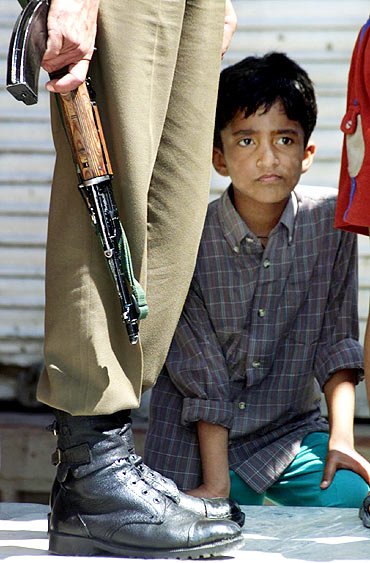
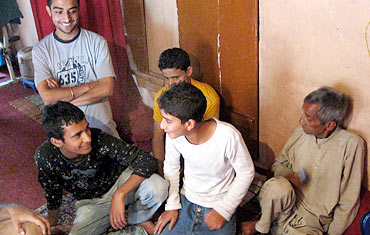
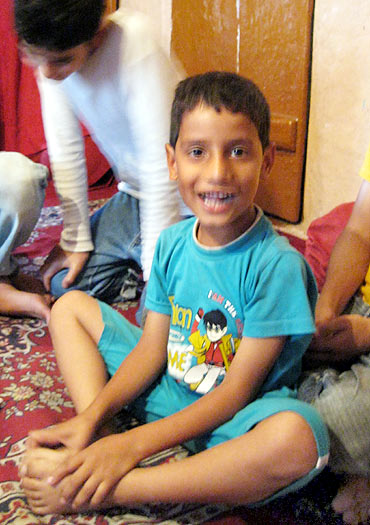
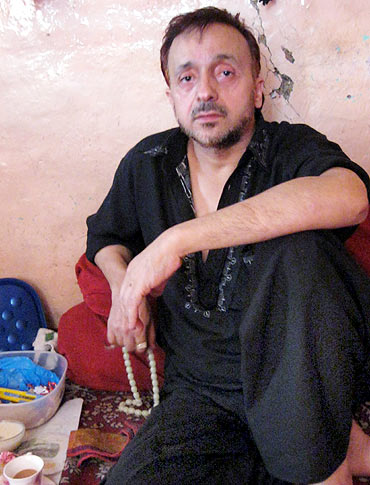
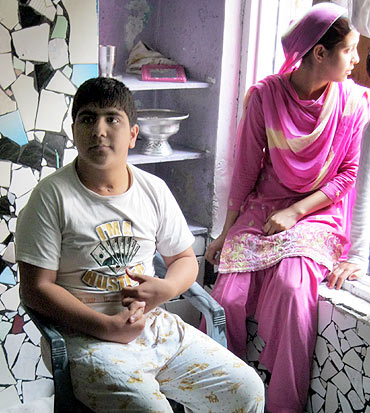
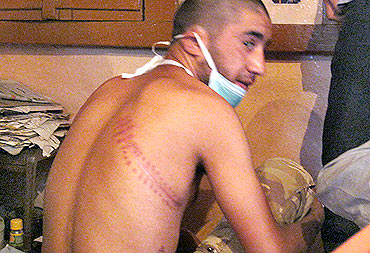
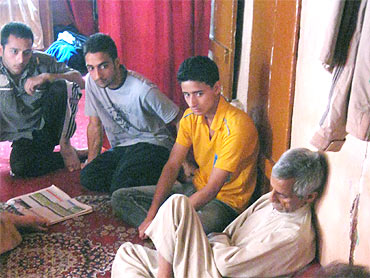
article